Online Community Criticizes Gym Goer for Insisting on Bringing His Puppy with Separation Anxiety Despite Other Customers' Complaints
Some pet owners are so entitled that they think they can take their dogs everywhere. Sure, there are places where there are no clear rules about bringing dogs.
But these dog owners need to prioritize safety. Not all environments are suitable for their furry companions.
They could be risking the lives of others because of their entitlement. If you're unsure whether you can bring your dog to an establishment, asking goes a long way.
You can always call the staff and ask for permission before bringing your dog along. And if they won't allow it, respect their decision.
The story we will look at today is about a gym-goer who is also a dog owner. He wanted to seek judgment from the "Am I The A**hole?" (AITA) subreddit because he received mixed reactions from his friends after he brought his dog to a gym, and a couple of guys complained about it.
The first time he brought his dog, no one complained — not even the staff. His fellow gym-goers also had positive reactions toward the dog, telling him that his puppy made them smile.
Eventually, he encountered not just one but two guys who weren't happy about what he was doing. One of them was approached by his dog and became comfortable.
Only then did he place a leash on the dog. The other guy cursed at him, saying dogs don't belong in the gym.
The original poster (OP) takes his dog to the gym regularly because it has separation anxiety.
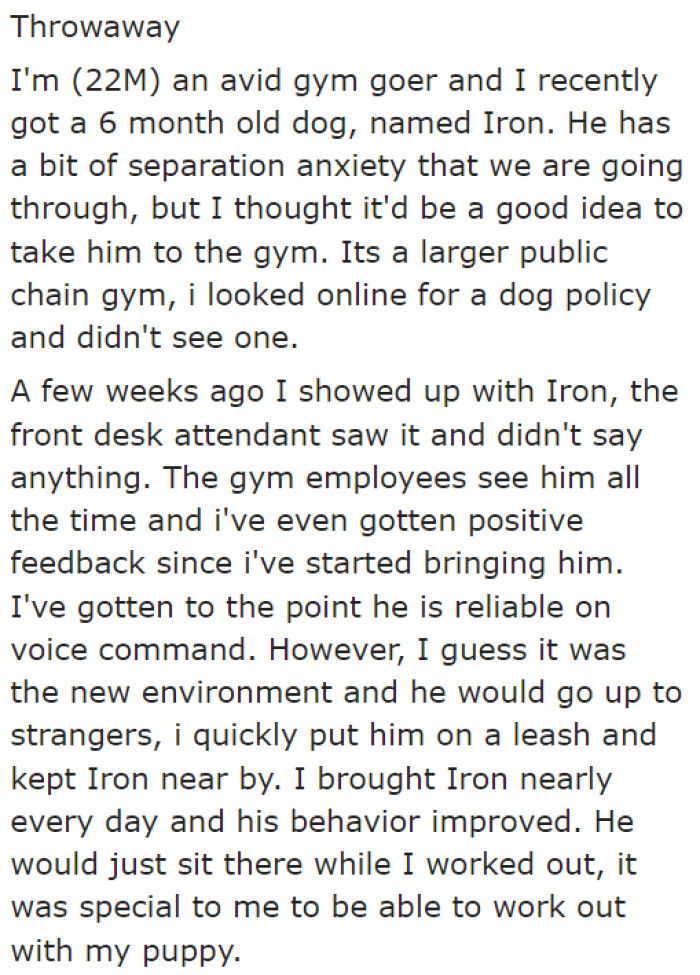
At first, some people didn't mind having the dog. But that changed when his dog ran up to a stranger working out.
Another customer complained about his dog as well. But he told the guy to look for another gym.
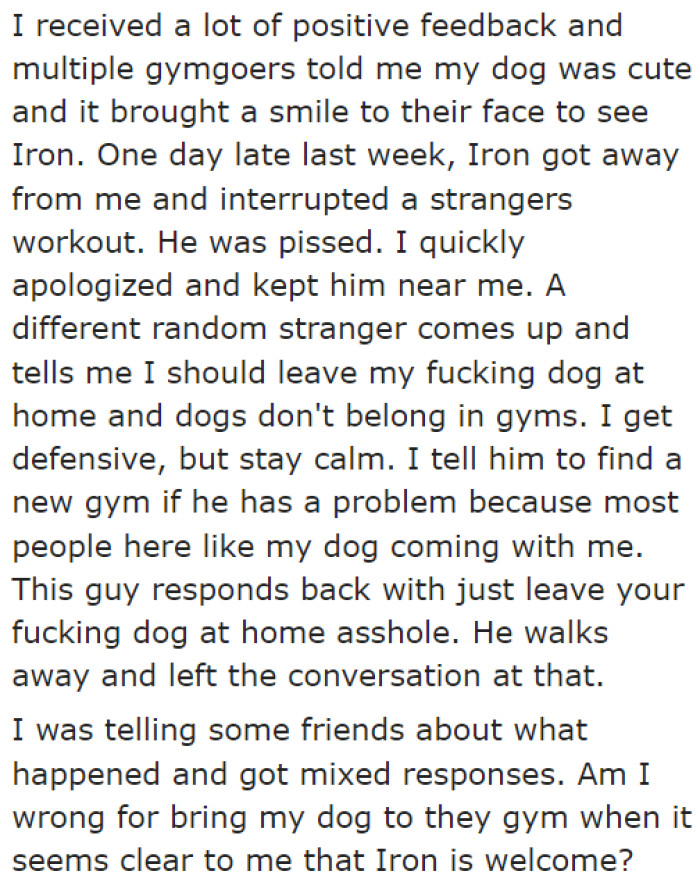
People on the subreddit are upset about his attitude, calling him the a-hole.

Understanding Attachment and Anxiety
This scenario sheds light on the psychological impacts of pet ownership, particularly concerning anxiety. Individuals with pets often form strong emotional bonds, leading to attachment styles that can manifest in various ways, including anxiety when separated from their pets.
Research from the Journal of Clinical Psychology indicates that separation anxiety in pets reflects their owners' emotional states, suggesting that the owner’s anxiety can exacerbate the pet’s distress.
This user is clearly upset about the OP's lack of common sense.

A user thinks that he's just using his dog to get attention from the ladies.
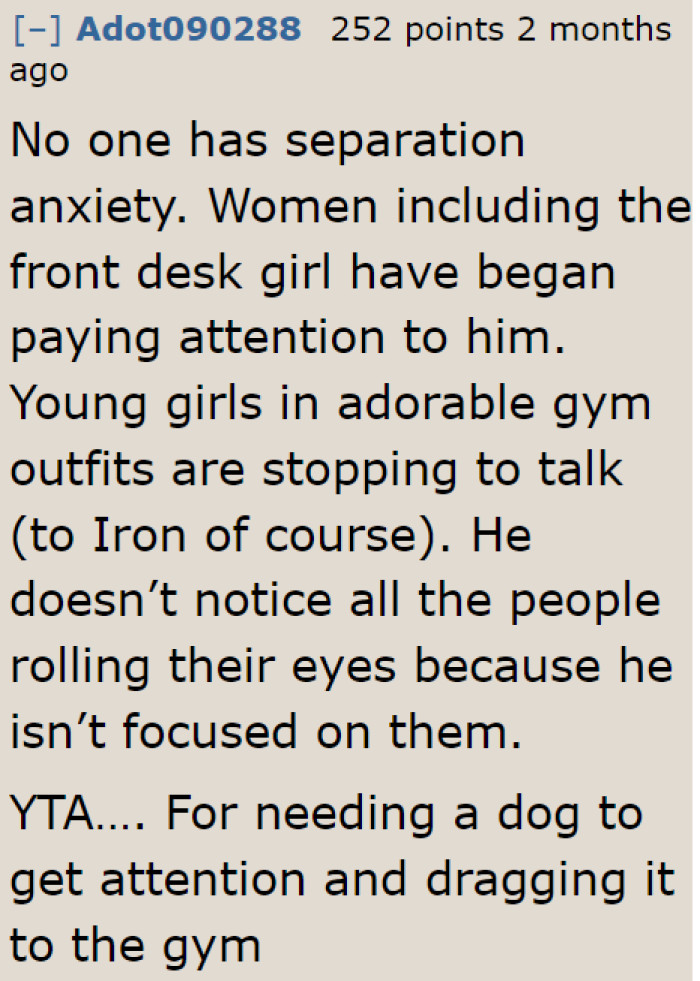
He isn't even considering the inconvenience his dog could possibly bring to other people.
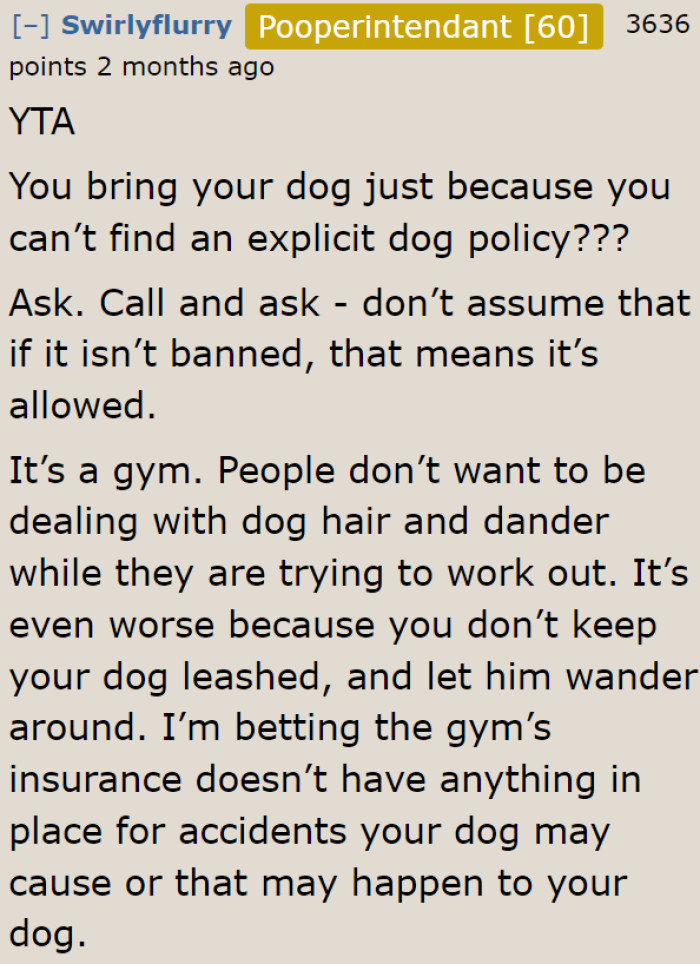
Moreover, the situation illustrates the interplay between personal needs and social obligations. When individuals prioritize their pet's needs over the comfort of others, it creates a tension that can lead to social isolation.
Studies have shown that such behaviors can be linked to attachment styles formed in childhood, where individuals may have learned to prioritize certain relationships over others, often leading to conflicts in social settings.
The gym management might add more policies because of entitled dog owners like him.

He shouldn't expect people in a public place to be comfortable with his dog.
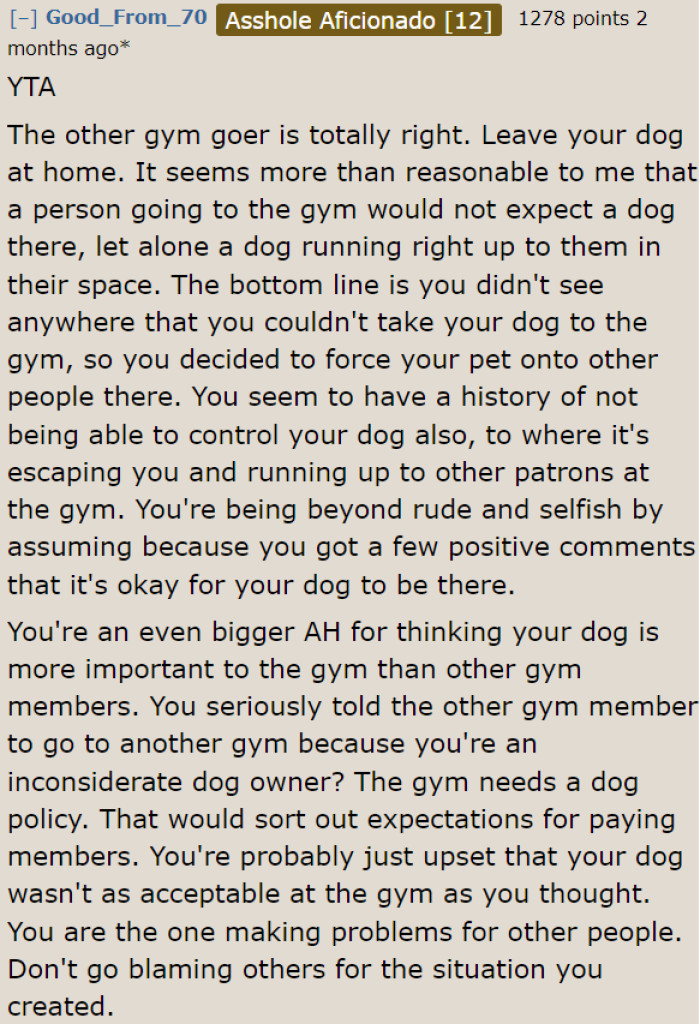
The OP also needs to be a responsible dog owner by training his dog to handle being home alone.
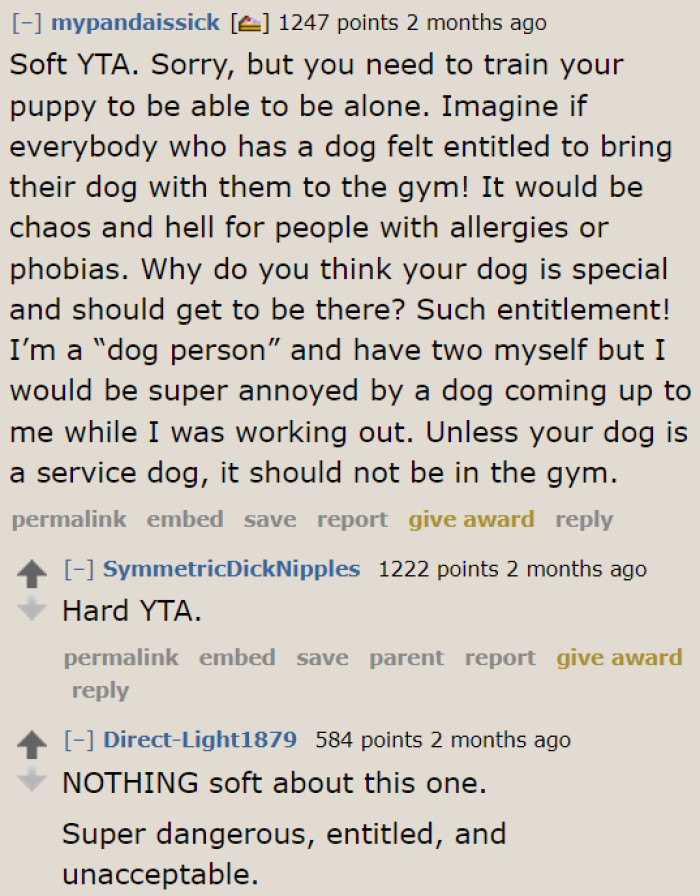
Strategies for Balancing Pet Needs with Social Considerations
To navigate these complex dynamics, experts recommend that pet owners practice mindfulness about their pets' needs in social contexts. Techniques such as breathing exercises or grounding strategies can help reduce anxiety for both the pet and the owner, fostering a more comfortable environment for everyone.
Research suggests that mindfulness practices can significantly reduce anxiety levels, promoting a calmer atmosphere in stressful situations.
An owner of an assistance dog gives the OP some advice.
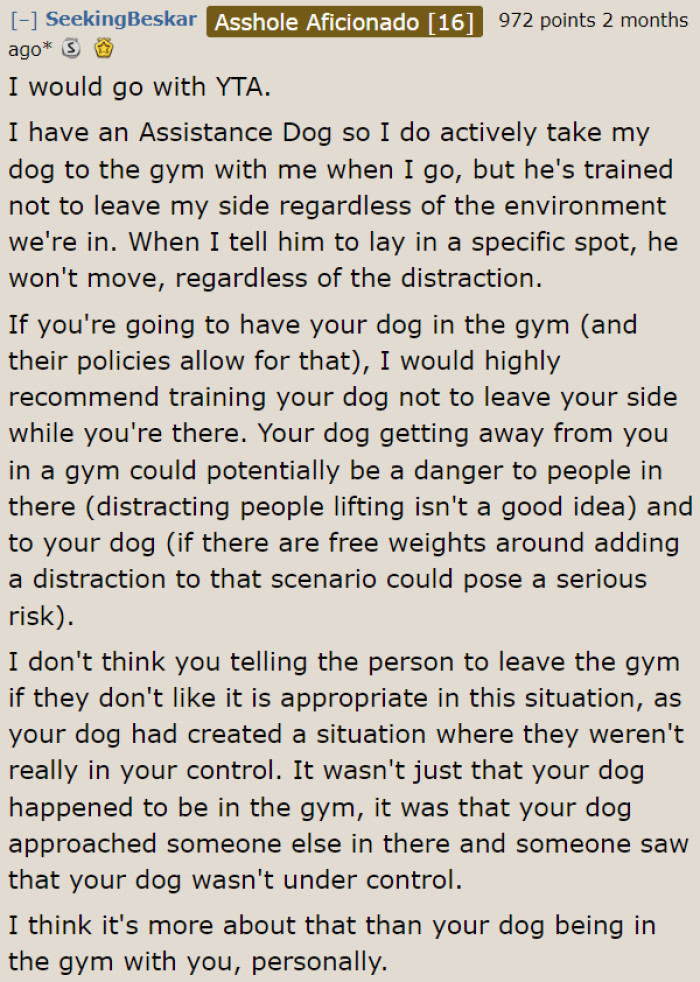
The OP should have at least leashed his dog so that it wouldn't bother anyone. He probably wouldn't have this problem if he kept his dog by his side at all times.
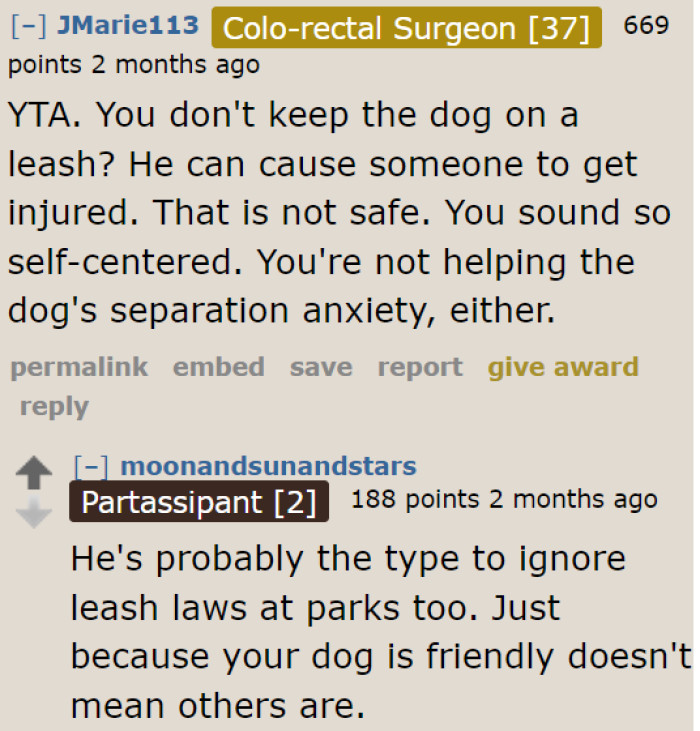
This gym-goer isn't thinking about what could happen if he continues to bring his dog to the establishment. What if his dog ends up biting a customer or if someone's allergy gets triggered?
Would he take responsibility? He doesn't need to wait for the worst thing to happen.
All he needs to do is train his dog so that it can deal with its separation anxiety.
Additionally, establishing clear boundaries around pets in public spaces can help mitigate conflicts. Experts suggest creating designated areas for pets and informing fellow gym-goers about the pet's presence beforehand.
By setting these expectations, pet owners can foster a more inclusive community that respects the needs of all individuals involved.
Psychological Analysis
This situation illustrates a common conflict in pet ownership where the owner's attachment to their pet may overshadow social norms regarding shared spaces. It’s essential for pet owners to recognize the diverse needs of those around them and strive for a more balanced approach.
Doing so can help foster a sense of community while still honoring the bond between pet and owner.
Analysis generated by AI
Analysis & Alternative Approaches
The dynamics of pet ownership in social situations reveal the complexities of attachment and anxiety. As noted by Dr. Esther Perel, a renowned couples therapist, "Understanding the emotional needs of both pets and people is essential for creating a harmonious environment." This highlights the importance of navigating these interactions thoughtfully. Ultimately, balancing the needs of pets with those of others requires open communication and mindfulness to create an inclusive atmosphere for everyone, as emphasized by Dr. Dan Ariely, a behavioral economist who states, "Effective communication can bridge the gap between differing needs in shared spaces."



